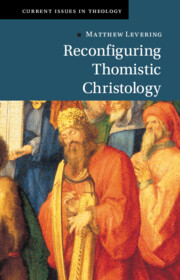Book contents
- Reconfiguring Thomistic Christology
- Current Issues in Theology
- Reviews
- Reconfiguring Thomistic Christology
- Copyright page
- Contents
- Acknowledgments
- Introduction
- 1 Contemporary Thomistic Christology
- 2 Christ the New Adam
- 3 Christ the New Isaac
- 4 Christ the New Moses
- 5 Christ the New Joshua
- 6 Christ the New David
- Conclusion
- Bibliography
- Index
2 - Christ the New Adam
The New Creation
Published online by Cambridge University Press: 24 May 2023
- Reconfiguring Thomistic Christology
- Current Issues in Theology
- Reviews
- Reconfiguring Thomistic Christology
- Copyright page
- Contents
- Acknowledgments
- Introduction
- 1 Contemporary Thomistic Christology
- 2 Christ the New Adam
- 3 Christ the New Isaac
- 4 Christ the New Moses
- 5 Christ the New Joshua
- 6 Christ the New David
- Conclusion
- Bibliography
- Index
Summary
In this book, Matthew Levering unites eschatologically charged biblical Christology with metaphysical and dogmatic Thomistic Christology, by highlighting the typological Christologies shared by Scripture, the Church Fathers, and Aquinas. Like the Church Fathers, Aquinas often reflected upon Jesus in typological terms (especially in his biblical commentaries), just as the New Testament does. Showing the connections between New Testament, Patristic, and Aquinas’s own typological portraits of Jesus, Levering reveals how the eschatological Jesus of biblical scholarship can be integrated with Thomistic Christology. His study produces a fully contemporary Thomistic Christology that unites Ressourcement and Thomistic modes of theological inquiry, thereby bridging two schools of contemporary theology that too often are imagined as rivals. Levering's book reflects and augments the current resurgence of Thomistic Christology as an ecumenical project of relevance to all Christians.
- Type
- Chapter
- Information
- Reconfiguring Thomistic Christology , pp. 61 - 103Publisher: Cambridge University PressPrint publication year: 2023

